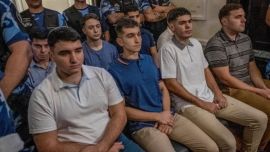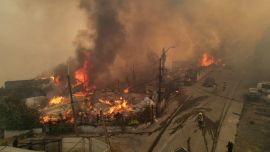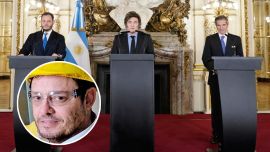At least for the past decade it has been pretty difficult for Argentines to escape that uncomfortable and consistent feeling that an important economic crisis is around the corner, sparking comparisons with the implosion of the country and the economy in 2001 and 2002. With the PASO primaries only a few weeks away and a general election promising to be a game-changer coming later this year, a cloud of uncertainty has taken over, bringing with it increased socio-economic turbulence and the spectre that Argentina could once again go over the edge. The continuation of triple-digit inflation and what appears to be economic stagnation feels increasingly unbearable and it is difficult to imagine that any of the presidential contenders will really be able to tame the wild beast that is the Argentine economy, particularly given the level of polarisation and the deep political fragmentation that has crystallised ahead of this electoral process. And once again the International Monetary Fund takes a leading role, holding the fate of the embattled nation in its hands. Argentines have become incredibly resilient, generating a massive tolerance for intense states of crisis which would most probably paralyse others, which in turn has probably created an overshoot in levels of pessimism that appear unwarranted when looking at the underlying fundamentals which suggest an exit to this level of mediocrity should be near. At the same time, the country’s elites have messed it up so many times that this level of complexity could once again lead to failed execution, pushing Argentina once again into a free fall.
From a political standpoint, the situation has certain similarities to the post-2001 scenario. The convertibility which equated a peso to a dollar for over a decade had fallen, leading to a confiscation of deposits followed by a tough devaluation, which unleashed a wave of social discontent toppling the government of Fernando De La Rúa after failing to garner the support of the Peronist opposition—led by Eduardo Duhalde—and the IMF. Widespread protests, looting, and social violence erupted as the people called on the political class to disappear. In the 2003 presidential elections, Duhalde, who had become interim president after an institutional crisis broke out in the aftermath of De La Rúa’s resignation, supported a little-known governor from the Patagonian province of Santa Cruz, Néstor Kirchner. With 22.25 percent of the vote, Kirchner who had Daniel Scioli as his running-mate lost against former president Carlos Menem (24.45 percent), who desisted from facing off with him in the runoff and thus acknowledged defeat. Liberal economist Ricardo López Murphy came in third with 16.37 percent of the vote, followed by Adolfo Rodríguez Saá—who fleetingly held the presidency before being essentially forced out by Duhalde—(14.11 percent), and Elisa “Lilita” Carrió (14.05 percent). Blank and spoiled ballots votes totalled 2.72 percent despite widespread disillusionment with the political class.
Together, the five front-runners and the blank votes accounted for 94 percent of the votes. This time around, and using an average of polls put together by La Política Online, the individual frontrunner appears to be Economy Minister Sergio Massa with 24.8 percent projected voting intention. He will be facing Juan Grabois (3.9 percent) in the Peronist primaries. Across the aisle are Patricia Bullrich (16.4 percent) and Horacio Rodríguez Larreta (15.4 percent), and to their right is ultra-liberal economist Javier Milei (20.8 percent). If we add the 10.7 percent who remain unsure, that’s 92 percent of the electorate. The 2001 implosion was responsible for a rebalancing of the political field of play, breaking the hegemony between Peronists and the Civic Radical Union (UCR), which begat Kirchnerism as a new Peronist iteration and its opposition, Mauricio Macri’s Pro party which morphed into an anti-Kirchnerist coalition absorbing the UCR. That political configuration appears to have finally reached its expiry date. The leading coalitions have fractured internally between hawks and doves, with Massa and Rodríguez Larreta trending toward centrist moderation, while Cristina Fernández de Kirchner—represented by Grabois—and Bullrich—who represents Macri—move toward the edges of their respective ideological groups. Finally, Milei and Bullrich seem more in tune with each other, as does Grabois with the traditional leftist parties. The past two administrations, those led by Macri and Alberto Fernández, have demonstrated that the current bi-coalitionist makeup was effective electorally but absolutely deficient in terms of governing and administering the state. Once the electoral dust has settled, the categories by which Argentina’s political spectrum is categorised will be redefined.
While Kirchnerism and macrismo will have finally let go of their hold on the centrality of the political scene, they are not doomed into political insignificance. Mrs. Fernández de Kirchner remains the single most influential political leader in Argentina, and the makeup of the legislative lists responding to Unión por la Patria suggest loyal deputies and senators will continue to respond to her. If Axel Kicillof retains the Province of Buenos Aires, it will add another variable on her behalf. The failed experiment that was the presidency of Alberto Fernández along with the emergence of Massa as the coalition’s leading candidate delineate the potential fault lines within the ruling coalition, with the eternal pressure of the Peronist governors who are traditionally conservative.
The tensions in Juntos por el Cambio have been evident since the day that Rodríguez Larreta made his presidential aspirations clear, entering into a dispute with the coalition’s alpha male, Macri. Beyond the fact that the Argentine political ecosystem needs to learn to deal with primaries, the Macri-Bullrich tough guy stance has cemented a position which, as mentioned above, is closer to the farther right ideology espoused by Milei. At the same time, Rodríguez Larreta’s consensus-building platform has absorbed the majority positions within the UCR, and is more in line with a sort of post-Kirchnerite Peronism that is somewhat aligned with a pro-business social-democracy. Not far from what Massa would probably believe. Whatever the outcome of the primaries, Macri and his followers will be convinced that an important portion of society is ideologically aligned with them, appealing to Bullrich’s and Milei’s voters.
It will be interesting to see how the campaign evolves after the primaries, where internally antagonistic forces will have to team up in order to retain an ideologically different electorate. In the aftermath of the election it is probable that both of the major coalitions will fracture. This is intimately tied to an economic situation which appears absolutely dire given the troubling lack of dollars in the Central Bank’s coffers. Unless the IMF decides to drastically change its stance and push Argentina into default, and if either Massa fails to contain the macroeconomic variables, or if the coming government fails in its structural reforms, the Argentine economy should be able to drag itself past the finish line. This doesn’t mean that two decades of bonanza are in the cards, but at least there should be a path toward normalcy. All of this is contingent, of course, on the political class and the business elites finally getting it right.


















Comments